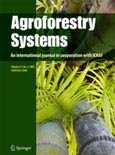This extension booklet presents, in a simple language and aided by tables and illustrations, the initial results of a collaborative research project being carried out in the Bragantina and Guama regions, State of Para, in the Eastern Brazilian Amazon. The project aims to develop ways to increase the economic value of secondary forests growing in smallholder farms, and is coordinated by the Brazilian Enterprise for Agricultural Research (EMBRAPA), the Faculty of Agricultural Sciences of the State of Para (FCAP), the Center for International Forestry Research (CIFOR) and the Tropical Agricultural Centre for Research and Higher Education (CATIE). The booklet represents an effort to devolve information to farmers. It includes results of a socio-economic study on the role of secondary forests in farmers' livelihoods, floristic inventories in secondary forests on smallholder farms and a market survey of promissing products from secondary forests.


















